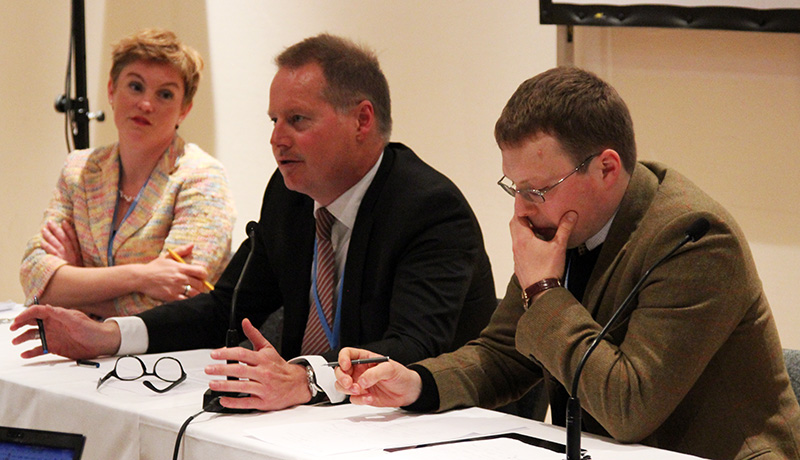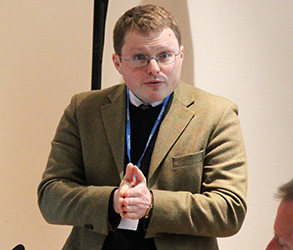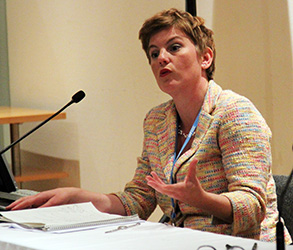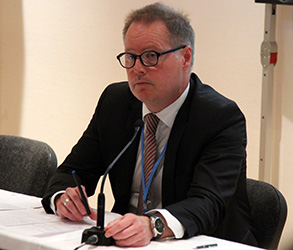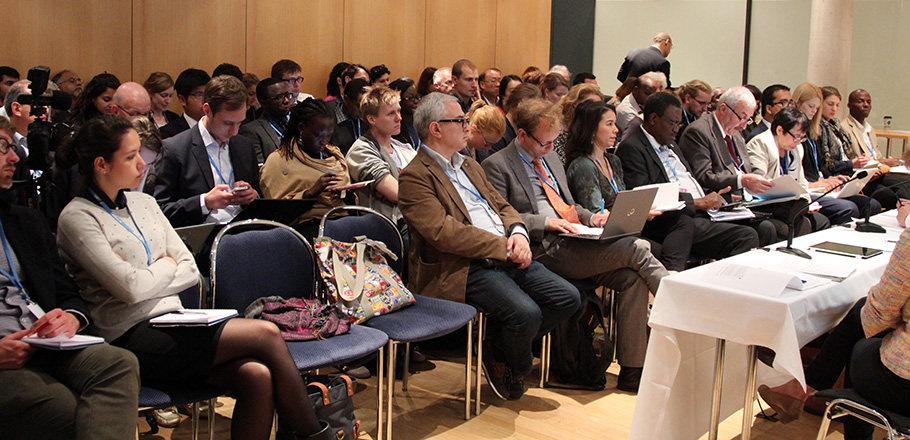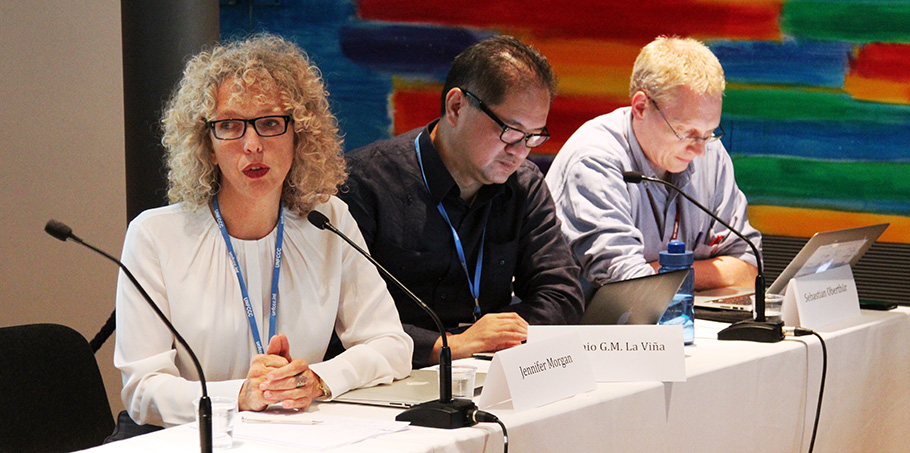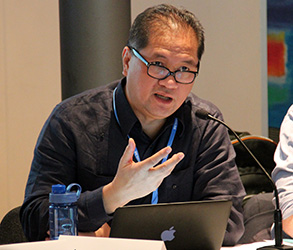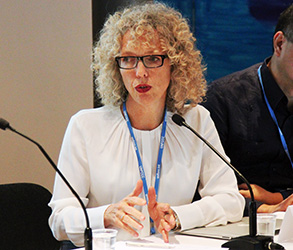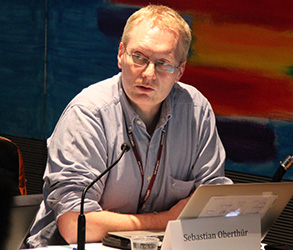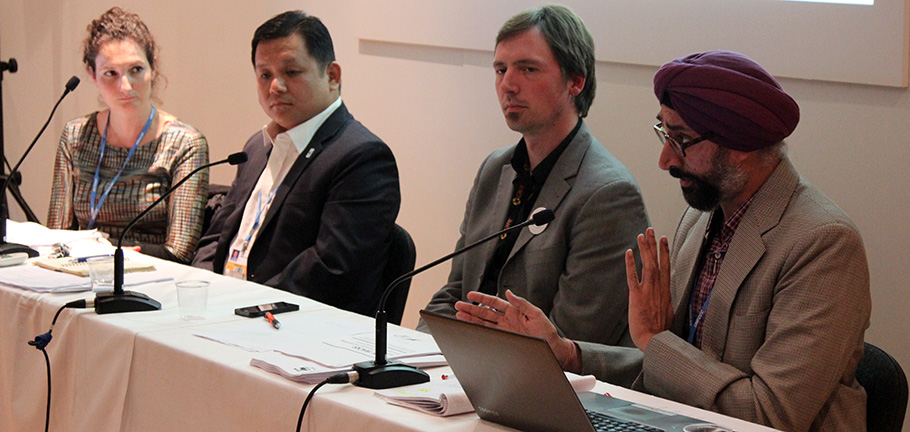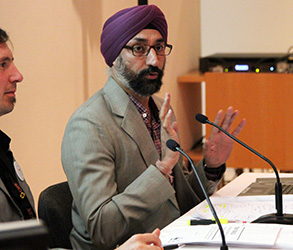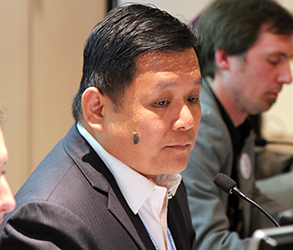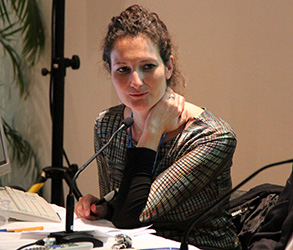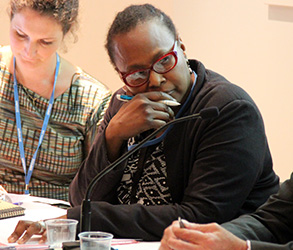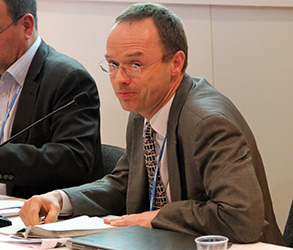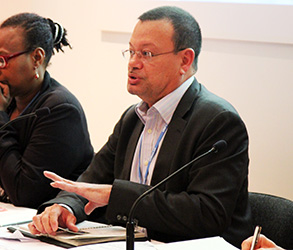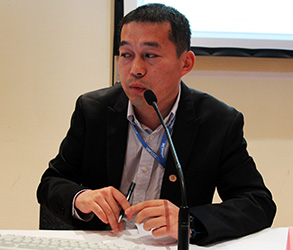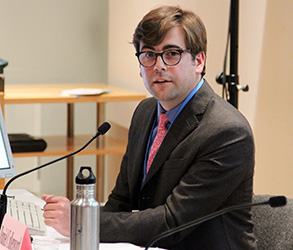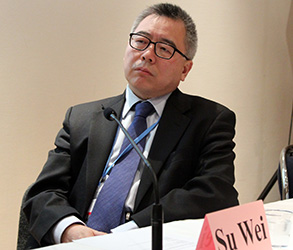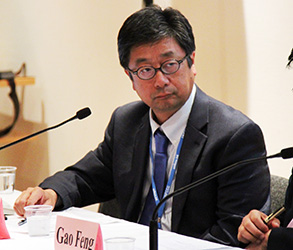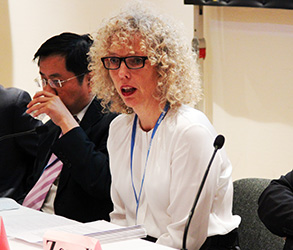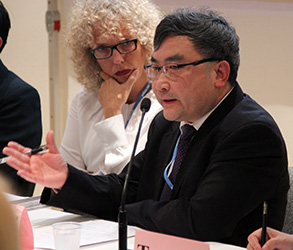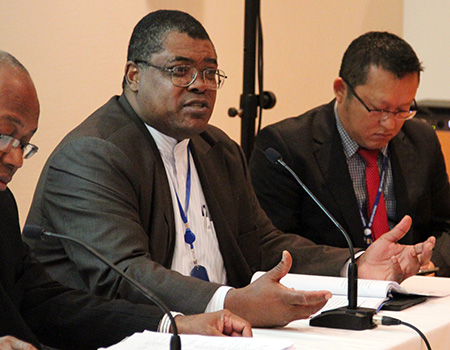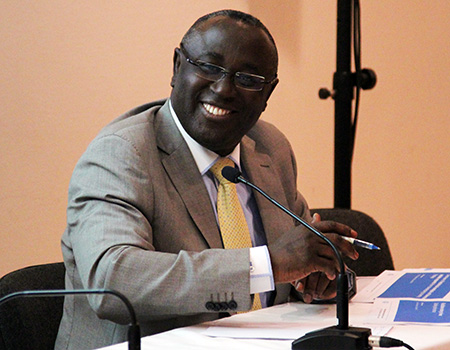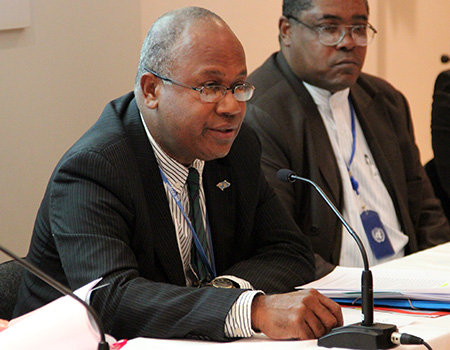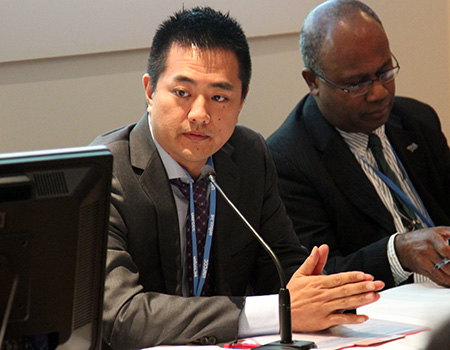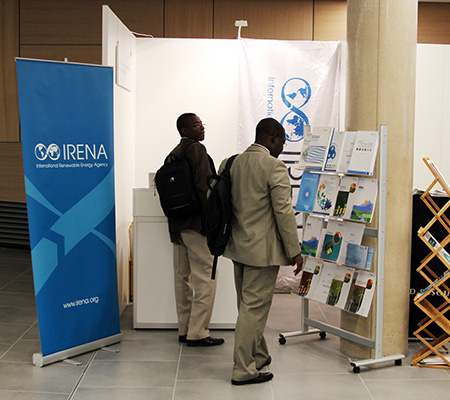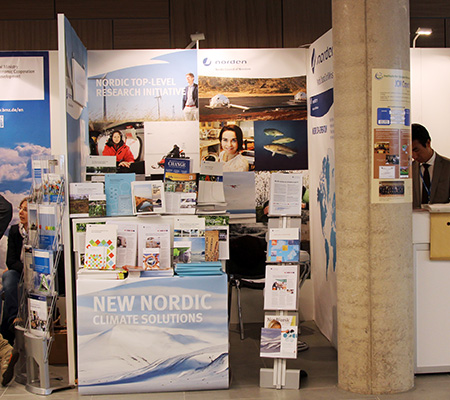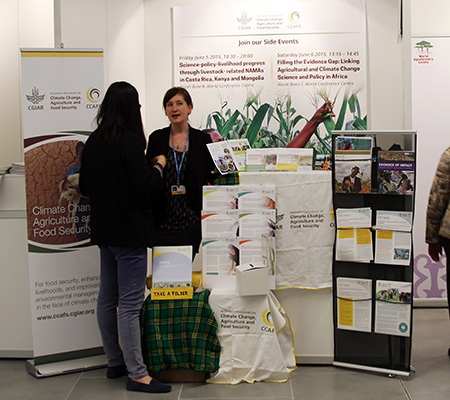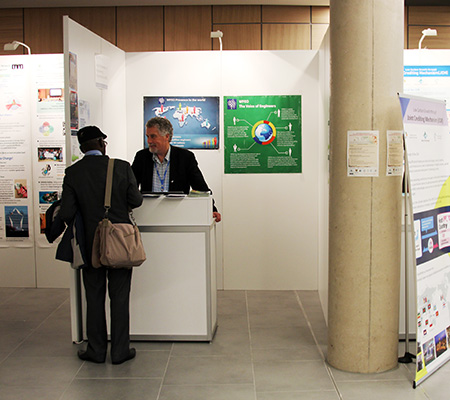Bonn Climate Change Conference - June 2015
1-11 June 2015 | Bonn, Germany
 |
 |
 |
Coverage of Selected Side Events at SBI 42, SBSTA 42 and ADP2-9
Highlights for Tuesday, 2 June 2015
Subscribe to our ENBOTS Reports |
||
|
Receive our ENBOTS bulletins and reports by email |
||

| Follow @IISDRS | ||

Loading... |
||
|
Receive emailed updates with the news articles above plus related information and announcements from our CLIMATE-L community mailing list: |
||
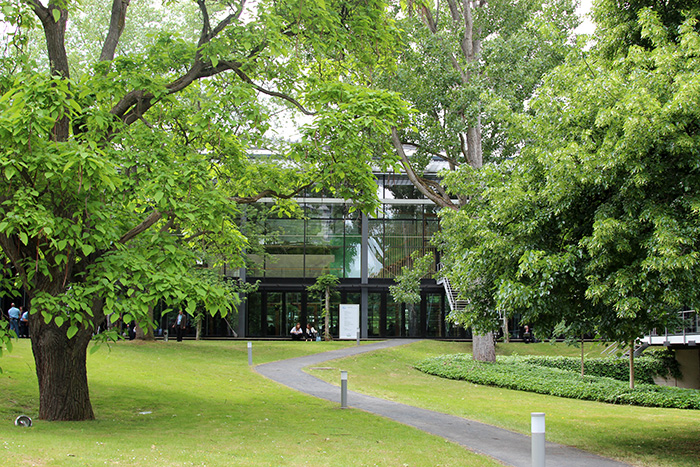
A view of the World Conference Center Bonn |
||
|
The following side events were covered by ENBOTS on Tuesday, 2 June 2015.
|
||
|
IISD Reporting Services, through its Earth Negotiations Bulletin on the Side (ENBOTS) Meeting Coverage, is providing daily digital coverage from selected side events at the Bonn Climate Change Conference - June 2015. | ||
Carbon Subsidies + Climate Change – Emissions Reductions from Fossil Fuel Subsidy Reform and Intended Nationally Determined Contributions (INDCs)
Organized by Nordic Council of Ministers (NCM), Denmark and
the International Institute for Sustainable Development (IISD)
|
|
|
|
This session considered issues surrounding fossil fuel subsidy reform, the potential for emissions reductions and fiscal savings and linkages with INDCs. Hans Jakob Eriksen, Special Advisor, Ministry of Climate, Energy and Building, Denmark, opened the session. He noted the growing momentum for reforming fossil fuel subsidies, highlighting 30 countries that have carried out reform over the past year. He presented recent outreach activities of the Friends of Fossil Fuel Subsidy Reform, expressing hope for further progress before COP 21. | ||
|
|
||||
Building a Comprehensive Agreement: Legal Suggestions from the ACT 2015 Consortium
Organized by ACT 2015 Consortium partners
|
|
Introducing the Agreement for Climate Transformation (ACT 2015) proposal on the Paris agreement as an exercise to identify what roles and functions the Paris agreement should play for low carbon, climate resilient development, Jennifer Morgan, World Resources Institute, opened the session. She highlighted the proposed agreement's two goals of building climate resilience and phasing out greenhouse gas emissions to net zero, both of which would be supported by three cycles of adaptation, mitigation and support (finance, technology transfer and capacity building). | ||
|
|
|
|
||||
Twin Tracks for Ambitious Action: Post-2015 Development and the Paris Deal
Organized by CARE International, ActionAid, and WWF International
|
|
|
|
|
Moderated by Lina Dabbagh, Climate Action Network International, this event discussed opportunities to achieve synergies across the major international negotiations taking place this year, especially the post-2015 summit and the ongoing negotiations on climate change. | ||
|
|
|
|
||||
Understanding the China-US Joint Announcement on Climate Change
Organized by Tsinghua University, University of California, Berkeley, and
Lawrence Berkeley National Laboratory
|
|
|
|
This event considered Chinese and US perspectives on the China-US Joint Announcement on Climate Change. | ||
|
|
|
|
||||
Update on the Implementation of International Consultation and Analysis (ICA)
Organized by the UN Framework Convention on Climate Change (UNFCCC) Secretariat
|
|
|
At this event, moderated by Marion Vieweg-Mersmann, UNFCCC Secretariat, participants heard updates on the ICA on Biennial Update Reports (BURs) from non-Annex I parties to the UNFCCC. Amena Yauvoli, Subsidiary Body for Implementation (SBI) Chair, noted that the ICA process has two phases: the technical analysis, and the facilitative sharing of views. Noting that implementation of the ICA is on track, he listed key focus areas for the process: the training of experts on the technical analysis; the technical analysis of BURs; and the facilitative sharing of views. He informed participants that he had already begun consultations with parties on the design of the process going forward. Takeshi Enoki, Consultative Group of Experts on National Communications from non-Annex I Parties (CGE), presented on the training of technical experts for the technical analysis of the BURs, highlighting three information sharing clusters used in the training exercise: technical information, background material and REDD+. He noted that the experts nominated by parties need to attain at least 60% of the total score to pass proficiency exams during the training. Stressing that the process is non-punitive, non-intrusive and respecting of national sovereignty, Vieweg-Mersmann then presented on the ICA, noting that the first stage is submission of BURs, followed by the technical analysis and the facilitative sharing of views. Listing the 11 parties whose BURs are currently going through the first technical analysis, she noted that the technical analysis helps in identifying the capacity building needs of non-Annex I parties. She informed participants that the next round of technical analysis is planned for 17-21 August 2015. William Agyemang-Bonsu, UNFCCC Secretariat, spoke on the facilitative sharing of views, noting that 11 draft summary reports are being prepared out of the 13 BURs submitted. He noted that the process leading up to the facilitative sharing of views lasts up to nine months and the facilitative sharing of views begins three months later. He stated that due to this timeline, various scenarios for the meetings of the Subsidiary Bodies in 2016 are being considered. | ||
|
|
|
||||
|
|
|
|
|
The Earth Negotiations Bulletin on the side (ENBOTS) © <enb@iisd.org> is a special publication of the International Institute for Sustainable Development (IISD). This issue has been written by Rishikesh Ram Bhandary, Tallash Kantai and Gillian Nelson, Ph.D. The Digital Editor is Mike Muzurakis. The Editor is Dan Birchall <dan@iisd.org>. The Director of IISD Reporting Services is Langston James “Kimo” Goree VI <kimo@iisd.org>. Specific funding for coverage of side events through ENBOTS has been provided by the Kingdom of Saudi Arabia. The opinions expressed in ENBOTS are those of the authors and do not necessarily reflect the views of IISD and funders. Excerpts from ENBOTS may be used in non-commercial publications only with appropriate academic citation. For permission to use this material in commercial publications, contact the Director of IISD Reporting Services at <kimo@iisd.org>. Electronic versions of issues of ENBOTS from the Bonn Climate Change Conference - June 2015 can be found on the Linkages website at http://enb.iisd.org/climate/sb42/enbots/. The ENBOTS Team at the Bonn Climate Change Conference - June 2015 can be contacted by e-mail at <tallash@iisd.org>. | ||
has been provided by the Kingdom of Saudi Arabia and the European Union


IISD Reporting Services is grateful to the many donors of the Earth Negotiations Bulletin (ENB) and recognizes the following as core contributors to the ENB: the European Union, the Finnish Ministry for Foreign Affairs, the German Federal Ministry for the Environment, Nature Conservation, Building and Nuclear Safety (BMUB), the International Development Research Centre (IDRC), the Japanese Ministry of Environment (through the Institute for Global Environmental Strategies - IGES), the New Zealand Ministry of Foreign Affairs and Trade, the Kingdom of Saudi Arabia, SWAN International, Government of Switzerland (the Swiss Federal Office for the Environment (FOEN), the Swiss Agency for Development Cooperation (SDC), and the United Nations Environment Programme (UNEP). Funding for translation of the Bulletin into French is provided by the Government of France, the Wallonia, Québec, and the International Organization of La Francophonie/Institute for Sustainable Development of La Francophonie (IOF/IFDD).




